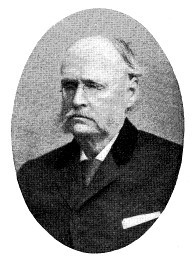| Profile | Major Works | Resources |
David Ames Wells, 1828-1898

19th C. American scientist, journalist and economist.
Originating from Springfield, Massachusetts, David A. Wells was educated at Williams College, receiving his degree in 1847, and going on to study at Harvard's Lawrence Scientific School, being among its first graduates in 1852. He was promptly appointed professor at Lawrence, and simultaneously became a lecturer at the Groton Academy. With George A. Bliss, Wells compiled an Annual of Scientific Discovery for fifteen years, intending to popularize the physical sciences among students and the general public. In the late 1850s, he published a series of books for popular audiences on the principles of chemistry, geology and physical sciences. Wells's Natural Philosophy (1857), although designed for general audiences, was a popular college textbook.
From 1864, Wells took a decided turn towards economic topics. David A. Wells started out as a tentative protectionist, defending Lincoln's tariffs. In 1865, on the strength of a popular pamphlet on public finance, President Abraham Lincoln appointed David A. Wells as head of the newly-established Federal Revenue Commission. Wells's 1866-69 reports are considered classics in public finance and he quickly acquired a substantial reputation as the leading fiscal authority in the United States.
David A. Wells converted to the liberal cause after a fact-finding tour of Europe on behalf of the government in 1867. He returned a confirmed believer in free trade and a laissez-faire activist. Like his hero, Frederic Bastiat (whose works he helped edit), Wells sought to bring the free trade message to the American popular audience, and was sometimes referred to as the "American Cobden". Wells became a leading opponent of income taxes and government ownership of public works and a proponent of careful indirect taxation. His opposition to protective tariffs earned him the enmity of powerful politicians and journalists, like Horace Greeley, who eventually engineered his departure from Washington in 1869. From his new perch in Connecticut, David Wells continued to sit on local and state revenue commissions and public works projects. Wells was active in the American Social Science Association (ASSA) and served as its president from 1875 to 1879.
In a bizarre 1889 book, David A. Wells betrayed his liberal instincts and began applauding monopolistic trust corporations as "progress". Wells argued that "excessive" competition and the development of high finance has permitted American corporations to continue operating at a loss for years on end. As prices can remain below cost of production for extended periods of time, Wells speculated, this may result in chronic "over-production" in the economy. Thus, by combining, monopolistic trusts can be said to have solved the over-production "problem" and restored "normal" profits. He applauded trusts as the "solution" to economy-wide crises. Wells had thus morphed from a classical liberal into a quintessential American apologist.
David A. Wells endowed an economics dissertation prize at Harvard that continues to be awarded to this day.
|
Major Works of David A. Wells
|
|
HET
|
|
Resources on David A. Wells
|
All rights reserved, Gonçalo L. Fonseca
